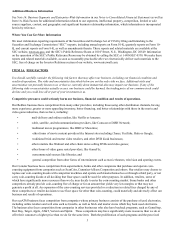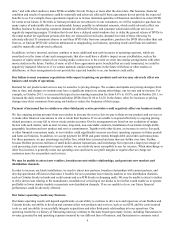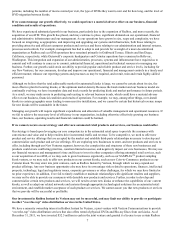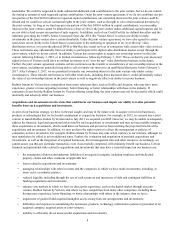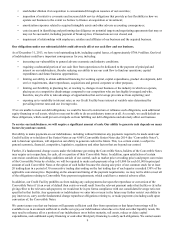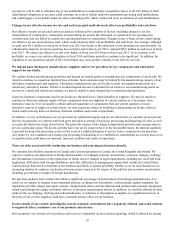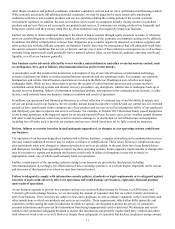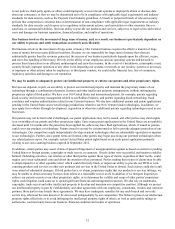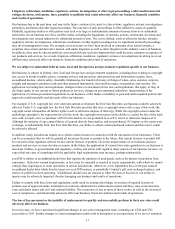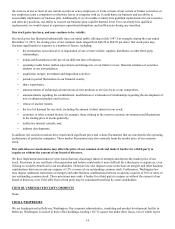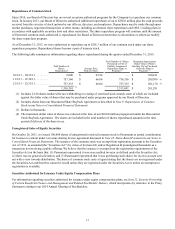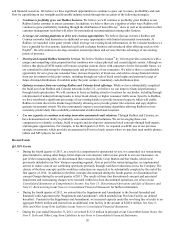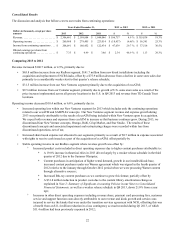Redbox 2013 Annual Report Download - page 21
Download and view the complete annual report
Please find page 21 of the 2013 Redbox annual report below. You can navigate through the pages in the report by either clicking on the pages listed below, or by using the keyword search tool below to find specific information within the annual report.12
to our policies, third-party agents or others could improperly access relevant systems or improperly obtain or disclose data
about our consumers, or that we may be determined not to be in compliance with applicable legal requirements and industry
standards for data security, such as the Payment Card Industry guidelines. A breach or purported breach of relevant security
policies that compromises consumer data or determination of non-compliance with applicable legal requirements or industry
standards for data security could expose us to regulatory enforcement actions, card association or other monetary fines or
sanctions, or contractual liabilities, limit our ability to provide our products and services, subject us to legal action and related
costs and damage our business reputation, financial position, and results of operations.
Our business involves the movement of large sums of money, and, as a result, our business is particularly dependent on
our ability to process and settle transactions accurately and efficiently.
Our business involves the movement of large sums of money. Our Coinstar business requires the effective transfer of large
sums of money between many different locations. Because we are responsible for large sums of money that often are
substantially greater than the revenues generated, the success of our business particularly depends upon the efficient, secure,
and error-free handling of the money. We rely on the ability of our employees and our operating systems and network to
process these transactions in an efficient, uninterrupted and error-free manner. In the event of a breakdown, catastrophic event,
security breach, improper operation or any other event impacting our systems or network or our vendors’ systems or processes,
or improper or other actions taken by employees, or third party vendors, we could suffer financial loss, loss of consumers,
regulatory sanctions and damage to our reputation.
We may be unable to adequately protect our intellectual property or enforce our patents and other proprietary rights.
Our success depends, in part, on our ability to protect our intellectual property and maintain the proprietary nature of our
technology through a combination of patents, licenses and other intellectual property arrangements, without infringing the
proprietary rights of third parties. We have over 100 United States and international patents, for example, patents regarding
kiosk security and inventory management related to our Redbox business, and patents regarding kiosk networking, fraud
avoidance and voucher authentication related to our Coinstar business. We also have additional patents and patent applications
pending in the United States and several foreign jurisdictions related to our New Venture kiosk technologies. In addition, we
may apply for or obtain (through development, acquisition or otherwise) additional patents regarding technologies used in our
businesses.
Our patents may not be held valid if challenged, our patent applications may not be issued, and other parties may claim rights
in or ownership of our patents and other proprietary rights. Since many patent applications in the United States are not publicly
disclosed until 18 months after the patent has been applied for, others may have filed applications, which, if issued as patents,
could cover our products or technology. Patents issued to us may be circumvented or fail to provide adequate protection of our
technologies. Our competitors might independently develop or patent technologies that are substantially equivalent or superior
to our technologies. Further, since patent terms are limited, other parties may begin practicing our patented technologies when
our related patents expire. For example, certain United States patent rights based on an early patent application primarily
relating to our coin-counting business expired in September 2012.
In addition, certain parties may assert claims of patent infringement or misappropriation against us based on current or pending
United States or foreign patents, copyrights or trade secrets, or contracts. If such claims were successful, our business could be
harmed. Defending ourselves, our retailers or other third parties against these types of claims, regardless of their merits, could
require us to incur substantial costs and divert the attention of key personnel. Parties making these types of claims may be able
to obtain injunctive or other equitable relief, which could effectively block or impair our ability to provide our DVD or coin-
counting products and services or other new products and services in the United States or abroad. Such claims could also result
in an award of substantial damages. If third parties have, or obtain, proprietary rights that our products or services infringe, we
may be unable to obtain necessary licenses from others at a reasonable cost or at all. In addition, if we instigate litigation to
enforce our patents or protect our other proprietary rights, or to determine the validity and scope of other parties’ proprietary
rights, such litigation could cause us to spend significant financial and management resources. We also rely on trademarks,
copyrights, trade secrets and other intellectual property to develop and maintain our competitive position. Although we protect
our intellectual property in part by confidentiality and other agreements with our employees, consultants, vendors and corporate
partners, these parties may breach these agreements. We may have inadequate remedies for any such breach and our trade
secrets may otherwise become known or be discovered independently by our competitors. The failure to protect our intellectual
property rights effectively or to avoid infringing the intellectual property rights of others, as well as unfavorable rulings or
settlements, could seriously harm our business, financial condition and results of operations.



